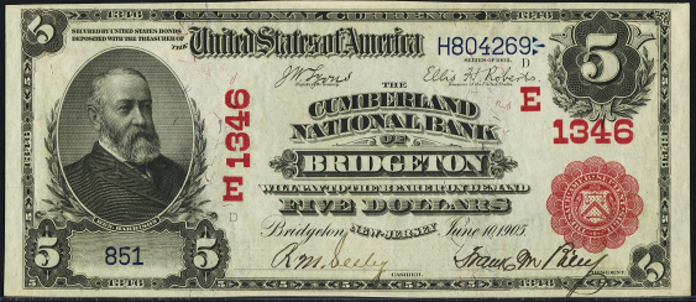Five Dollar Notes › Nationals › 1902 Five Dollar National Bank Notes › California Charters › 1902 $5 Beverly Hills California Liberty National Bank
Get Value Now
| Item | Info |
|---|---|
| Series | 1902 |
| Charter | #12909 Liberty National Bank of Beverly Hills, California |
| Year Chartered | 1926, 156 Banks Chartered |
| City Info | Beverly Hills is a city in Los Angeles County, California, United States, surrounded by the cities of Los Angeles and West Hollywood. Originally a Spanish ranch where lima beans were grown, Beverly Hills was incorporated in 1914 by a group of investors who had failed to find oil, but found water instead and eventually decided to develop it into a town. By 2013, its population had grown to 34,658. Sometimes referred to as "90210", one of its primary ZIP codes, it was home to many actors and celebrities throughout the 20th century. The city includes the Rodeo Drive shopping district and the Beverly Hills Oil Field. Source: Wikipedia |
| Similar Cities | If your note doesn't match try: 1. Beverly Hills, California - First National Bank 2. Beverly Hills, California - Beverly National Bank 3. Beverly Hills, California - California National Bank |
| Seal Varieties | Red, Blue |
| See Also | If your note doesn't match try: 1. 1907 $5 Legal Tender 2. 1899 $5 Silver Certificates |
| Other Info | 1. Value depends on notes known for charter, condition and market demand. |
| Neat Fact | Red Seals issued in sheets of 4 $5 notes (Friedbergs, 20th Ed. P126) |
No Obligations Offers and Appraisals
Please submit a good photo or scan. It will be identified and evaluated. Understand there may be subtle differences between the image you see above and your note. Signatures, design, markings and note condition will determine the offer price. Notes in Uncirculated or better condition receive the best offers.
Appraisals can be estimated for wholesale and retail prices. Wholesale is what dealers typically pay. Retail is what a collector might pay. Retail is slightly higher in most cases.
Please visit this page for USA Paper Money Reference. Do not treat this page as a reference guide, it is for appraisal and acquisition purposes only.
